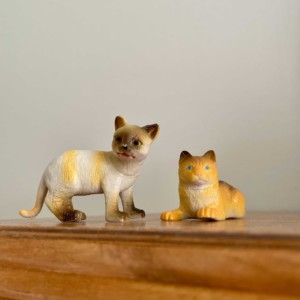Veera Lizé
A consultant who examines the meeting practices of work groups told a story about a company where every meeting room has a small cat figurine. Using a very concrete gesture, employees have the opportunity to grab the small funny character when they want to address a difficult subject, or put a cat on the table, as we say in Finnish. Dealing with issues that affect the whole group is made easier when a humorous gimmick lowers the threshold to tackle troublesome topics.
One of the most awkward subjects to deal with is the experience of failure in your own work. Explaining disappointment is tedious, and it is especially difficult to tell the funder that the activity they have financed has not gone as originally planned.
In many cases, both a good opportunity and a missed one will only be recognized in hindsight. The artist writing the grant application is often expected to explain what is valuable in their own work, and what they expect of themselves, but it is important to look at things afterwards and pose the question, how did it go?

Where can I speak about failure?
The funder has a responsibility to monitor the impact of the activities they have financed, and new tools are constantly being developed. In 2019, Frame began breakfast meetings with artists that it supports to meet them face to face. The Kone Foundation, on the other hand, has alumni activities that support a long-term relationship with grant recipients. How could we lower the threshold to make it easier for everyone to share negative experiences too? Taking responsibility is also about funders facilitating feedback.
Frame conducts a survey of grant recipients every two years. In the previous survey, 92% felt that the funded project had some impact on their international career, but I can’t help wondering what the percentage that failed to answer the question might have thought. Perhaps it was impossible to determine the causal relationship, or too little time had passed to be able to assess the consequences.
Identifying positive and negative occasions in hindsight is certainly useful for the artist, and it is also valuable information for the funder. Above all, however, it is information that should be able to be relayed through a safe channel, directly and without fear of losing an upcoming grant or being labeled ungrateful.
Cats on the table!
Who would dare to put a cat on the table and tell the financier about a bad experience, or admit, for example, that an overseas exhibition project went wrong? Even after something like that, funders should be brave enough to accept the information and learn from it.
I would like to say thank you to the two artists who received grants who responded to the Frame survey by saying that the project Frame supported had no impact on their international careers. Thank you for the trust you showed when you told us about this. I don’t know of any funders who have developed tools like toy cats, but let’s start by saying out loud that all news is good news and even difficult feedback is welcome.
— Veera Lizé
Veera Lizé is the Grants Coordinator at Frame Contemporary Art Finland.
This blog is a platform for reflecting work, current issues and discussions in arts by Frame staff members and other contributors. This blogpost was published in English and in Finnish.
